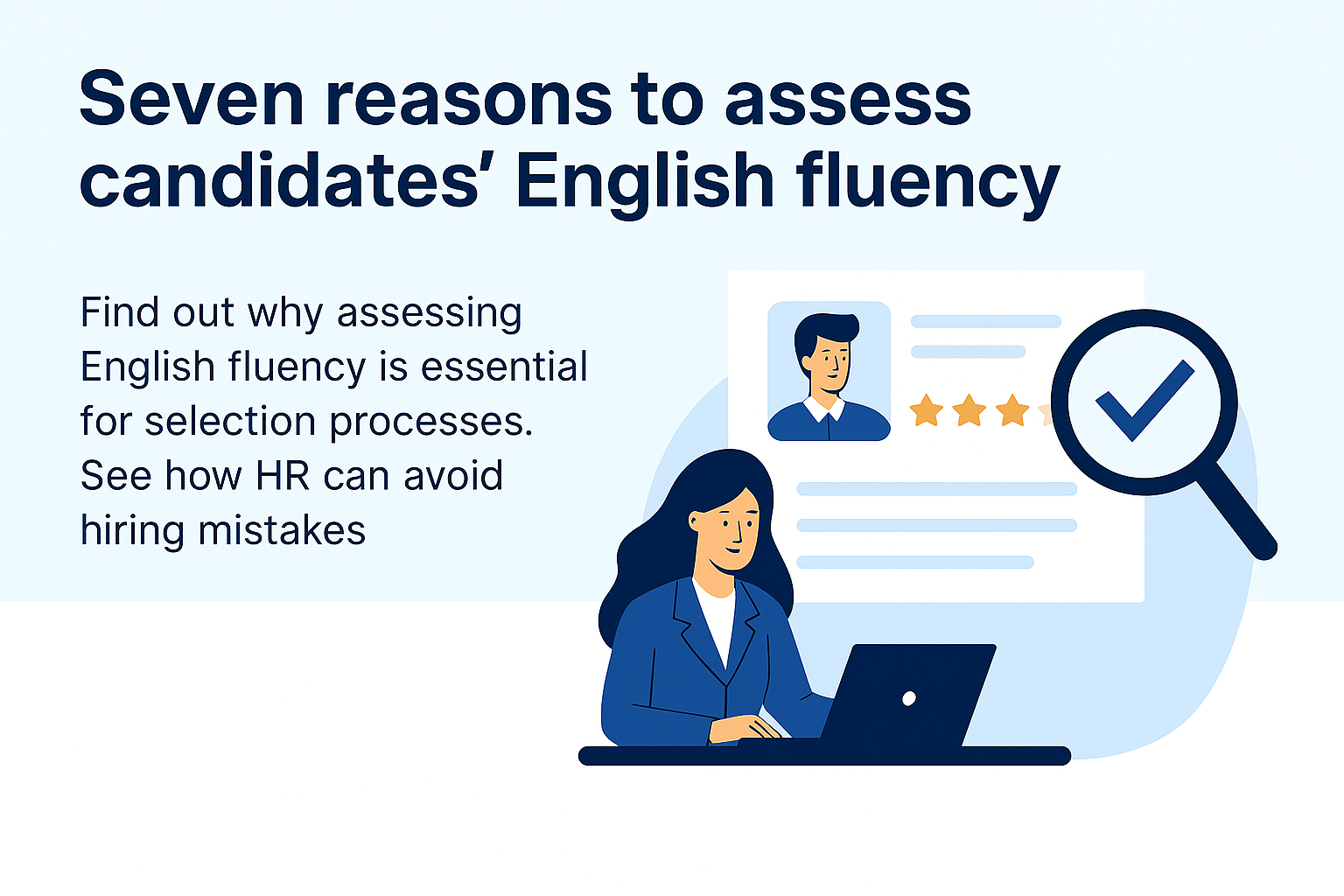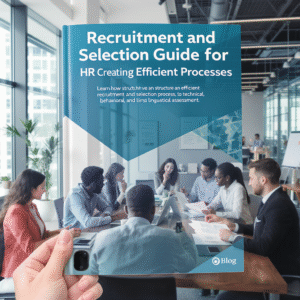Find out why assessing English fluency is essential for selection processes. See how HR can avoid hiring mistakes.
Assessing candidates’ fluency in English is an increasingly strategic stage in the selection processes conducted by Human Resources teams.
In a globalized market, where companies operate with branches and clients worldwide, fluency in English has become a crucial skill, not only for executive positions but also for operational, technical, and service roles.
In this article, we present seven reasons why HR should carefully assess the English fluency of its candidates and how to make this process more objective, fair and efficient. Check out what you’ll learn:
The Growing Demand for English-Fluent Candidates
Fluency in English is in high demand across sectors, especially in companies with international operations or global partnerships.
In a connected corporate world, mastering English has become a strategic requirement rather than a nice-to-have.
Fluent professionals can:
- Participate in meetings with international stakeholders;
- Interpret technical documents accurately;
- Represent the company in global events.
This trend is reshaping hiring standards. Recruiters are actively seeking candidates with real fluency—not just basic or intermediate knowledge.
Evaluating fluency early in the hiring process is a practical response to today’s globalized work environment.
1. Understand the Difference Between Fluency and Proficiency
Before evaluating, it’s essential to distinguish two often-confused terms:
Fluency is the ability to communicate naturally and efficiently, even with occasional mistakes. It’s about rhythm, clarity, and flow in genuine interactions.
Proficiency refers to formal and technical language knowledge—grammar, vocabulary, reading, and writing—usually measured by standardized exams like TOEFL, IELTS, or Cambridge.
This distinction helps align the evaluation to the job requirements. A client-facing role needs fluency; document-heavy roles may require proficiency.
2. Avoid Post-Hire Surprises
Candidates often overestimate their English skills. A resume claiming “advanced English” may hide basic comprehension or speaking difficulties.
According to EF Education First, only one-third of professionals globally have functional English proficiency at work.
If gaps are discovered post-hire, the consequences include:
- Poor performance in meetings;
- Communication errors;
- Rework and delays;
- Struggles integrating into global teams.
Assessing fluency early prevents misaligned hires and ensures a smoother onboarding process.
3. Match Language Skills to Role Demands
There is no one-size-fits-all fluency level. Language needs vary by role:
- Customer-facing roles require speaking clarity and listening skills.
- Technical positions demand industry-specific vocabulary.
- Administrative roles need strong reading and writing for emails and reports.
HR can better match candidates to roles by evaluating the specific fluency level required for each position.
4. Reduce Costs from Post-Hire Training
Hiring someone with lower-than-needed fluency often leads to unexpected training expenses.
While training is valuable, it should be strategic, not corrective.
Pre-hire fluency assessments allow companies to:
- Invest training resources in development, not remediation;
- Focus on advanced communication skills, not basics.
5. Improve Internal and External Communication
In multicultural environments, English fluency boosts collaboration and credibility.
Fluent professionals:
- Join meetings without needing translation;
- Understand and convey messages clearly;
- Contribute confidently to global projects;
- Enhance the team’s image with international clients.
Internally, fluency fosters alignment across global teams. Externally, it strengthens the company’s international presence.
6. Enhance Global Competitiveness
Fluent teams act more quickly and confidently in international markets. They can:
- Seize global opportunities;
- Negotiate deals across borders;
- Work seamlessly with partners and clients worldwide;
- Scale international operations.
English fluency in candidates is a long-term strategic advantage for companies expanding globally.
7. Use Specialized Tools for Fluency Assessment
Relying on informal interviews or self-assessments is a risky approach.
Today, HR teams can use AI-powered tools that provide:
- Realistic speaking tests;
- Evaluation of pronunciation, vocabulary, clarity, and fluency;
- Fast and comparable results;
- Bias-free assessments.
This technology enables scalable, high-quality evaluations even in high-volume recruitment.
FluencyFlow: Smart, Fast, and Scalable English Fluency Testing
FluencyFlow is one of the most advanced tools for identifying real English fluency in candidates.
With FluencyFlow, recruiters can:
- Administer oral tests based on real job scenarios;
- Evaluate asynchronously without live interviews;
- Receive detailed fluency reports (speed, clarity, vocabulary);
- Integrate with ATS or HR systems;
- Shorten time-to-hire without compromising quality.
Designed for modern recruitment, FluencyFlow empowers HR professionals to make data-driven decisions rather than relying on assumptions.
Conclusion
Evaluating English fluency is no longer optional—it’s essential to global hiring success.
By understanding role-specific fluency needs, using specialized tools, and standardizing evaluation criteria, HR can:
- Improve hiring outcomes;
- Strengthen communication;
- Boost the company’s global competitiveness.
With platforms like FluencyFlow, HR teams gain control, speed, and confidence, making better hires for a future that is borderless.




